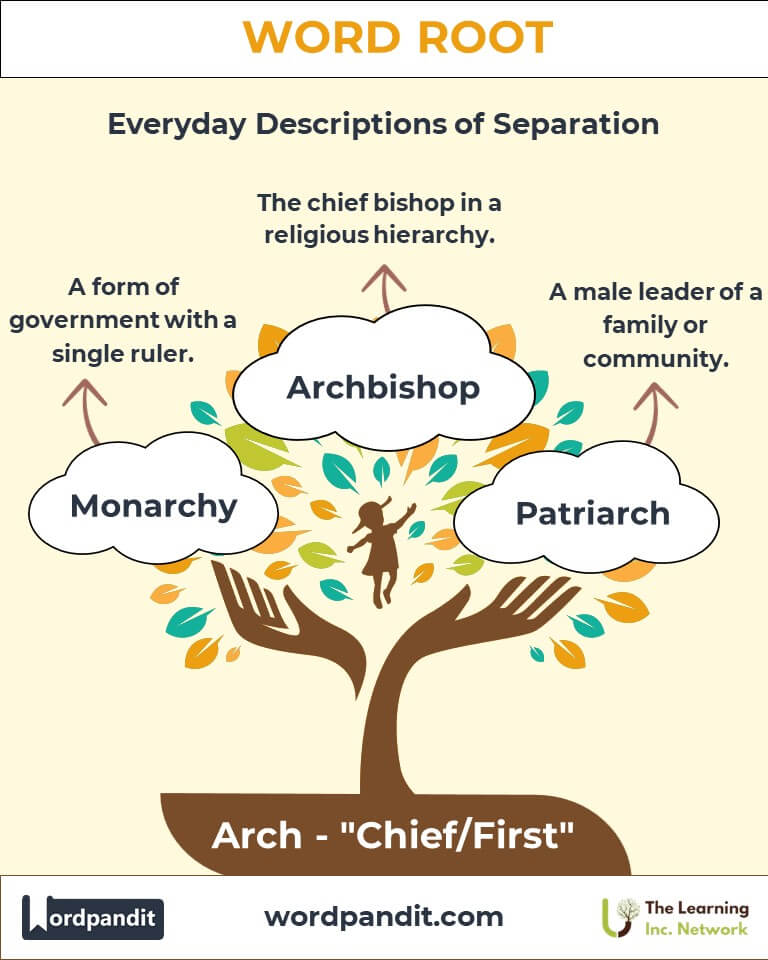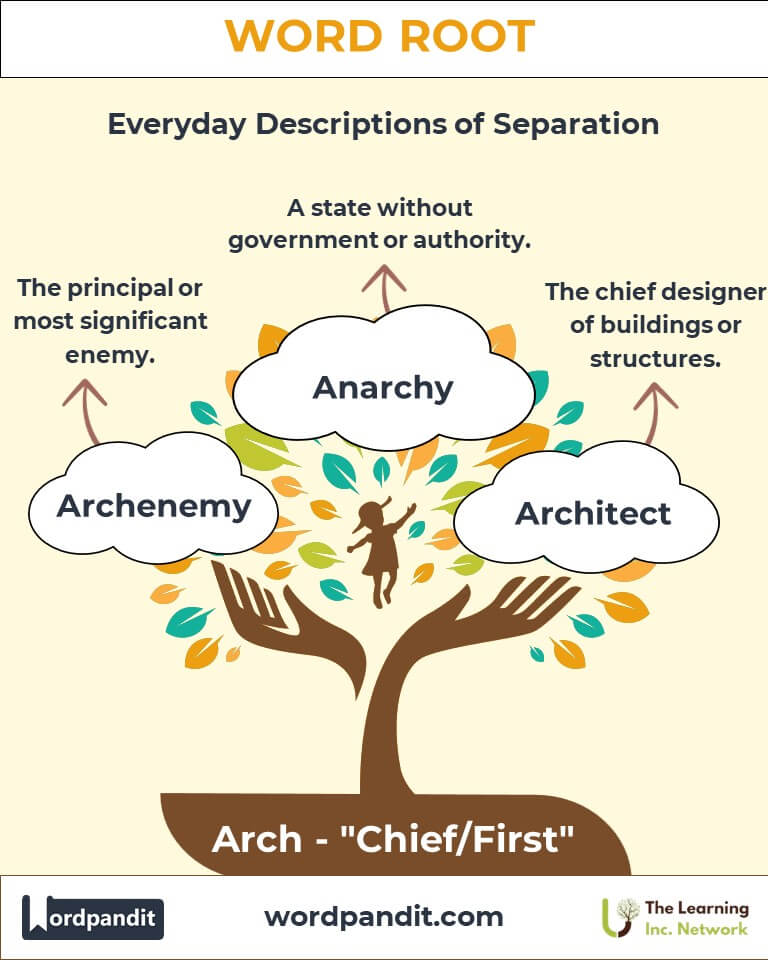Arch: The Root of Leadership and Origins Across Language
Discover the intriguing journey of the root "arch," originating from Greek and Latin, meaning "chief" or "first." This root has shaped words that define authority, origins, and pioneering roles in language, society, and specialized fields.

Table of Contents
- Introduction: The Power of Arch
- Etymology and Historical Journey
- Mnemonic: Unlocking the Power of Arch
- Common Arch-Related Terms
- Arch Through Time
- Arch in Specialized Fields
- Illustrative Story: Arch in Action
- Cultural Significance of Arch
- The Arch Family Tree
- FAQs about the Arch Word Root
- Test Your Knowledge: Arch Mastery Quiz
- Conclusion: The Living Legacy of Arch
Introduction: The Power of Arch
What do the words "architect" and "monarchy" have in common? They stem from the root "arch," which means "chief" or "first." Pronounced as "ahrk," this root evokes images of leadership, innovation, and foundational roles across disciplines. From rulers in monarchies to pioneering architects, "arch" embodies the essence of being at the forefront.

Etymology and Historical Journey
The root "arch" originates from the Greek word arkhos, meaning "leader" or "ruler," and the related verb archein, meaning "to rule." It passed into Latin as archi, retaining its connotation of primacy or authority. Over centuries, this root found its way into English, where it flourished in terms denoting leaders, creators, and original concepts, such as "archbishop" and "archenemy."
Mnemonic: Unlocking the Power of Arch
Picture an ornate archway at the entrance of a grand palace. It stands tall and commanding, symbolizing leadership and the "first" among structures.
Mnemonic Device: "Arch is the archway of authority—always leading and standing first."
Common Arch-Related Terms
- Architect (ahr-kuh-tekt): The chief designer of a building or structure.
- Example: "The architect envisioned a sustainable skyscraper."
- Monarchy (mon-ahr-kee): A form of government with a single ruler, often a king or queen.
- Example: "The monarchy has ruled for centuries in this region."
- Archbishop (ahrch-bish-uhp): The chief bishop in a region of the church.
- Example: "The archbishop delivered a moving sermon during the ceremony."
- Archenemy (ahrch-en-uh-mee): The principal or most significant enemy.
- Example: "The superhero faced their archenemy in an epic battle."
- Archetype (ahr-kee-tahyp): The original model or pattern from which others are copied.
- Example: "The novel’s protagonist is an archetype of the hero's journey."
Arch Through Time
- Patriarch (Ancient): From Greek patriarkhes, meaning "ruler of a family," this term originally denoted tribal or familial leaders.
- Anarchy (Medieval): Combining "arch" (rule) with "a-" (without), it came to signify a state without governance or authority.
- Architect (Modern): A specialized term for those who design structures, showcasing the root’s shift to denote creative leadership.
Arch in Specialized Fields
- Architecture:
- Architect: Designs and oversees the construction of buildings.
- Impact: Central to modern urban design and sustainability.
- Politics:
- Monarchy: Highlights the root’s legacy in systems of governance.
- Significance: Monarchical traditions continue in various cultures.
- Literature and Psychology:
- Archetype: Represents foundational ideas or characters.
- Example: Archetypes like the "wise old man" shape storytelling globally.
- Religion:
- Archbishop: A figure of authority in many Christian denominations.
- Role: Guides spiritual and organizational matters in their region.
Illustrative Story: Arch in Action
Amelia, an aspiring architect, marveled at the arches of an ancient cathedral. She dreamed of designing her own structures that symbolized leadership and innovation. Her journey was filled with challenges, including competing with an "archrival" in her field. But Amelia’s designs, inspired by archetypes of strength and beauty, ultimately crowned her as the "arch" of sustainable architecture in her community.
Cultural Significance of Arch
The root "arch" resonates deeply across cultures. Monarchies have defined eras in history, while architectural marvels, such as the Arch of Constantine in Rome, symbolize power and permanence. Even in modern storytelling, the concept of an "archenemy" or "archetype" reveals its cultural and psychological significance.

The Arch Family Tree
- Ark (Greek): Meaning "container or chest."
- Example: "Ark of the Covenant."
- Archaios (Greek): Meaning "ancient."
- Example: Archaeology (study of ancient things).
- Archeo- (Greek prefix): Denoting something ancient or primitive.
- Example: Archaeopteryx (ancient bird).

FAQs About the Arch Word Root
Q: What does "arch" mean?
A: The root "arch" means "chief" or "first." It originates from the Greek word arkhos, signifying leadership, authority, or primacy. This root is the foundation of many words that convey dominance, originality, or precedence in their respective fields.
Q: What is an archetype?
A: An archetype is the original model, pattern, or prototype from which other things are copied or developed. For example, the "hero" archetype in literature represents a character who undertakes a great journey or challenge, influencing countless stories and cultural works.
Q: How does "arch" relate to architecture?
A: In "architecture," the root "arch" refers to the chief or principal designer responsible for creating and planning structures. The term highlights the leadership and creativity involved in this discipline.
Q: What is an archenemy?
A: An archenemy is the most significant or principal enemy of someone. The prefix "arch-" emphasizes the high status of this adversary, often making them the most formidable opponent in stories or real-life rivalries.
Q: What does "anarchy" mean?
A: Anarchy combines the root "arch" (rule) with the prefix "a-" (without), meaning "without rule" or "lack of governance." It describes a state of disorder due to the absence of authority or government.
Q: Is "arch" always a prefix?
A: No, "arch" can function as a root or as part of compound words. While it often appears at the beginning of words (e.g., "archenemy"), it also occurs in standalone terms like "patriarch" or "monarch."
Q: What is the origin of "monarchy"?
A: "Monarchy" comes from the Greek words monos (one) and arkhos (leader), meaning "rule by one." It signifies a government led by a single ruler, such as a king or queen, and has been a prevalent form of governance throughout history.
Test Your Knowledge: Arch Word Root Quiz
1. What does the root "arch" signify?
2. Which term refers to a chief bishop?
3. What does "archetype" mean?
4. What is the meaning of "monarchy"?
5. What is "anarchy"?
Conclusion: The Living Legacy of Arch
The root "arch" embodies leadership, originality, and foundational concepts that have shaped language, culture, and history. From the grandeur of monarchies to the innovation of architects, this root continues to inspire and define. Understanding "arch" helps us appreciate the importance of being first—whether in creation, governance, or thought.














